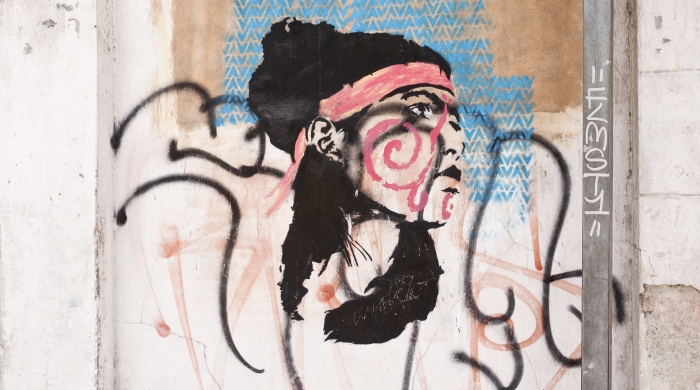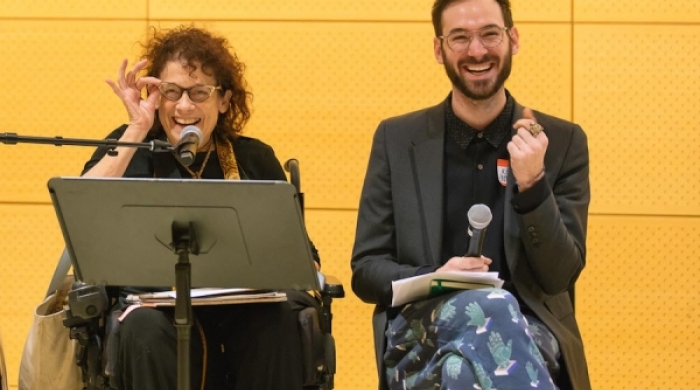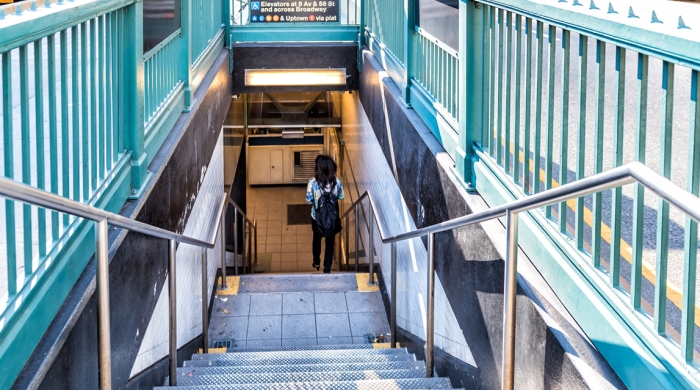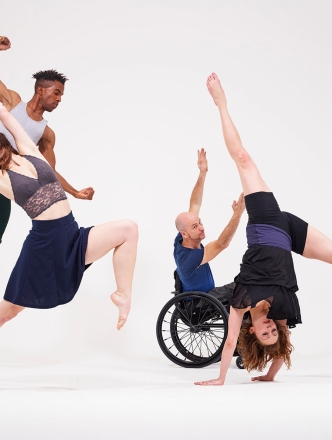
In this interdisciplinary undergraduate minor, you’ll learn about the historical, social, and legal circumstances that shape the experience of disability. Through course work and exposure to scholars and activists from across NYU in the humanities; social sciences; communication; education; engineering; medical ethics; and the arts, you’ll engage in creating a more just and inclusive society.

Degree Details
Official Degree Title
With the 16-credit undergraduate minor in Disability Studies, you’ll learn about the historical, social, and legal circumstances that shape the experience of disability. Learn the tenets and history of the disability rights movement, comparative global perspectives on disability, critical theories in the field of disability studies, principles of accessibility, the under-recognized history of eugenic prejudice, as well as the work of activists to change laws and social worlds.
Disability Studies understands disability in relation to other aspects of the human experience, including inequality, violence, and social movements; gender, race, and sexuality; media representations and practices; technology and design; arts access; and psychology and stigma. The field recognizes that disability is not a matter of discrete impairments, but rather an opportunity for coalition or identification. The field emphasizes the social shaping of disability through injustice and discrimination, biomedical and cultural norms, and legal or architectural barriers that prevent access to education, housing, employment, and transportation.
Resources
Contact
Questions? Email Professor Mara Mills.
Join the NYU Center for Disability Studies mailing list.
Center for Disability Studies
Learn about the NYU Center for Disability Studies.
Declare Minor
Declare the minor online with the Application for Cross-School Minor.
You will complete one of the Minor’s three Core Courses, each one approaching key concepts in the field through an innovative lens: media studies, person-centered design, and anthropology.
In addition to the Core course, you will select three Electives from across the university’s global network. The multidisciplinary offerings cover such topics as developing assistive technologies; the social shaping of disability through injustice and discrimination; legal or architectural barriers that prevent access to education, housing, employment, and transportation; medical ethics; and the work of activists to change laws and social worlds, among many other concentrations.
Students do not need to take the core course first, but they must receive a B- or higher in the class. Core courses may count as electives for students who complete more than one core.
Currently three schools offer courses that meet this requirement on an alternating annual basis, so that one of the required courses will be taught every year. Choose from one of the following courses:
MCC-UE 1026: Disability, Technology and Media
(Taught by Mara Mills, NYU Steinhardt)
This course examines the significance of technology to the definition and experience of disability; the relationship between disability and the development of new media; the politics of representation; and current debates between the fields of disability studies and media studies. Specific topics will include: biomedical technology and the establishment of norms; the category of “assistive technology;” cyborgs and prostheses as fact and as metaphor; inclusive architecture and design; visual rhetorics of disability in film and photography; staring and other practices of looking; medical and counter-medical performance; media advocacy, tactical media, and direct action. (4 credits)
CAM-UY 2204: Disability Studies
(Taught by Allan Goldstein, NYU Tandon)
This course introduces students to disability history, assistive technology and universal design, dynamically engaging students in the world of disability with project-based experiential learning. As a member of a team including a guest consultant with a disability, students will explore that person's interests, abilities, and desires and portray them with documentary or narrative digital storytelling. This active learning approach, carefully guided by the instructor, is supported with readings, guest lectures, videos and field trips that help students further understand the largest minority in the world. The end-of-semester is celebrated with a formal presentation of the person-centered digital projects, making the invisible visible. (4 credits)
ANTH-UA 209: Disability Worlds: Anthropological Perspectives (formerly ANTH-UA 113)
(Taught by Faye Ginsburg and Rayna Rapp, NYU College of Arts & Science)
This course examines the genealogy of disability as a topic in anthropology and related disciplines in the social sciences and humanities, exploring the relationship of such work to disability studies and activism. Ethnographic studies will be central to the class, stressing the significance of disability for theorizing human difference and across cultures. The course will also incorporate guest lectures, films, performance and relevant off-site activities in NYC. (4 credits)
CAS:
- ANST-GA 2500: Disability Across Species: Body Politics in More-than-Human Worlds (4 credits)
- ANTH-UA 35: Medical Anthropology (4 credits)
- ANTH-UA 36: Global Biocultures: Anthropological Perspectives on Public Health (4 credits)
- ANTH-UA 331: Human Rights and Culture (4 credits)
- ENGL-UA 735: Readings in Contemporary Literary Theory; Section 002: Disability Studies and U.S. Latine Literatures (4 credits)
- ENGL-UA 800 003: Blindness and Insight from King Lear to Jane Eyre (4 credits)
- AHSEM-UA 228: Disability Studies and Latin@ American Literature
- PHIL-UA 50: Medical Ethics (4 credits)
- HIST 283: AUTISM: The Making of an “Epidemic” (4 credits)
- HIST-UA 569: Bodily Rebellions: Global Disability Histories of Resistance and Community (4 credits)
- SCA-UA 481: Topics in SCA: Disability and Sexuality in American Culture (4 credits)
Gallatin:
- IDSEM-UG 1294: Health, Humanities, and Culture (4 credits)
- IDSEM-UG 1294: Philosophy of Medicine (4 credits)
- IDSEM-UG 1311: Mad Science/Mad Pride (4 credits)
- IDSEM-UG 1961: The Western History of Madness: From the Bible to DSM-5 (4 credits)
- FIRST-UG 419: First-Year Writing Seminar: Disability and the Arts (4 credits)
- FIRST-UG 816: First Year Research Seminar: Representations of Disability in Contemporary Memoir (4 credits)
Global Public Health:
- UGPH-GU 28: Ethics and Disability (4 credits)
- UGPH-GU 28: Ethics & Identity: Disability, Gender, and Race (4 credits)
School of Medicine:
- CAMS-UA 208 or CAMS-UA 192: Advanced Seminar: Speaking Our Minds - Narrating Mental Illness (4 credits)
School of Professional Studies:
- TCHT1-UC3490: Special Interest Tourism: Disabilities, Social Access and Service in the Hospitality Environment (3 credits)
Steinhardt:
- MCC-UE 1200-002 / Senior Media Seminar: Normal Media (4 credits)
- MPATE-GE 2018 Accessible Design of Digital Media
- OT-UE 1403: Disability Justice and Radical Inclusion (2 credits)
- OT-GE 2171: Disability in a Global Context (NYC; Accra: Buenos Aires; Tel Aviv) (3 credits)
- OT-GE 2194: Application of Assistive Technologies Used by People with Disabilities (3 credits) **Course open to juniors/seniors; instructor permission required.
- OT-GE 2900: Developing Assistive Technologies (3 credits)
- SPCED-UE 83: Foundations of Special Education (3 credits)
- SPCED-GE 2127: Disability, Diversity, and Equity in Family, School, and Community
(3 credits) - APSY-UE 1031: Mental Health: Historical, Social, and Political Perspectives (4 credits)
- VIP-UY 300XZ: VIP Everyday Assistive Technology (0-3 credits)
Tandon:
- CAM 2304: Disability and Theater (4 credits)
- DM-GY 9103: Developing Assistive Technologies (3 credits)
- STS 2214W: Medical Ethics (4 credits)
- DM-UY 4913-G: Digital Accessibility and Creative Applications (3 credits)
- DM-GY 9103-M: Access and Assistive Technology in Historic Sites and Museums (3 credits)
- OT-GE 2195: Access and Assistive Technology in Historic Sites and Museums (3 credits)
- DM-GY 9103: Looking Forward: Vision-Related Access and Assistive Tech (3 credits)
- VIP-GY 500 & VIP-GY 5001 / VIP-UY 300X & VIP-UY 3000 Creative Accessibility in Design (variable credits)
Tisch:
- ASPP-UT 1003-001: Comics, Disability, and Illness (4 credits; sophomores, juniors, seniors only)
- ASPP-UT 1006: Sensing Race: Affects, Phenomena, & Worlding Intimacies (4 credits; Juniors and Seniors only)
- ASPP-UT 1017: Queer and Disability Theory: The Then and Now of Crip (4 credits; Juniors and Seniors only with permission of instructor)
- IMNY-UT 241: Introduction to Assistive Technology (2 credits)
- IMNY-UT 248: Adapting Everyday Items (2 Credits)
- IMNY-UT 260-003: Stories of Illness: Graphic & Narrative Medicine (4 credits)
- ITPG-GT 2447: Developing Assistive Technologies (3 credits)
- ITPG-GT 3027 001 & DM-GY 9104 A: Multisensory Design (4 credits)
- THEA-UT 632: Theatre, Performance, and Disability Justice (4 credits)
- THEA-UT 732: Topics: Disability, Medicine, and the Performance of Embodied Difference (4 credits)
- THEA-UT 745: Disability & the Performance of Embodied Difference (4 credits)
Wagner:
- PADM-GP 4155: Disability, Policy and Leadership - Building an Accessible World (1.5 credits)
NYU Abu Dhabi
- COREP-AD 32: Stigma (4 credits)
- COREP-AD 53: Disability (4 credits)
- CCEA-UH1023: Dis/Abilities in Musical Contexts (4 credits)
NYU Shanghai:
- INTM-SHU 245-003: Introduction to Assistive Technology (2 credits)
- CCCF-SHU 101W22 PoH: Networked Bodies: Exhibits, Organ Donations, and Alternate States of Ability (4 credits)
- CEL-SHU 101C: Assistive Technology (4 credits)
The cross school minor steering committee members include Mara Mills, Faye Ginsburg, Allan Goldstein, and Kevin Gotkin.
Authoritative curriculum information can be found exclusively in the University Bulletin. All other content, including this webpage, is for informational purpose only. You can find the curriculum for this program on the Disability Studies minor page of the Bulletin.
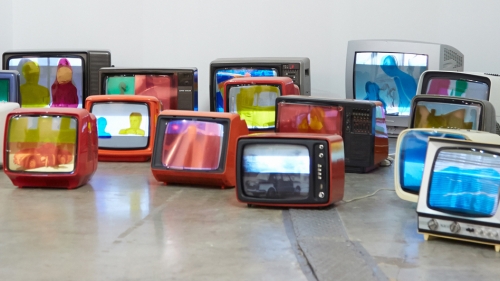
Media, Culture, and Communication
239 Greene Street, 8th floor
New York, NY 10003
212-998-5191 | contact

